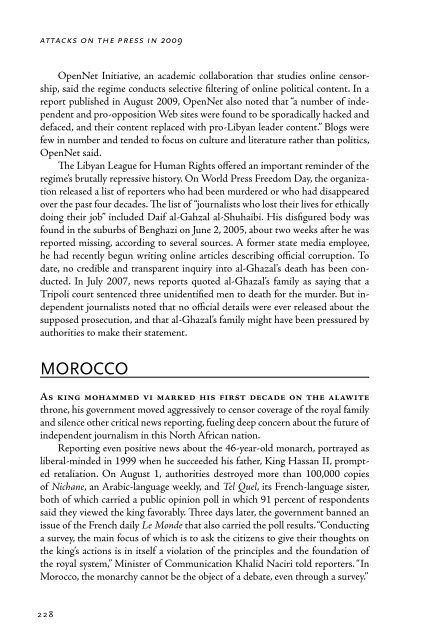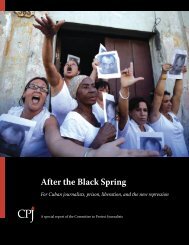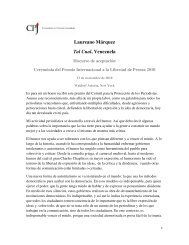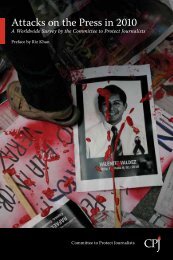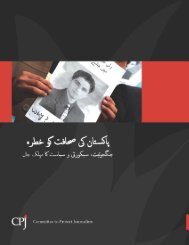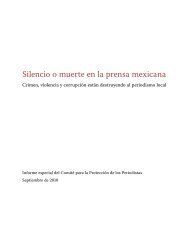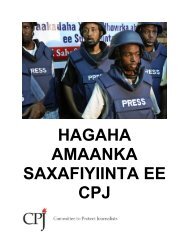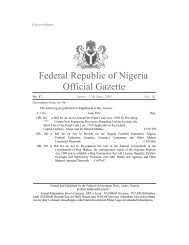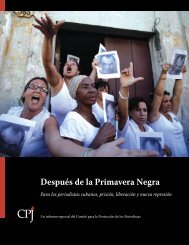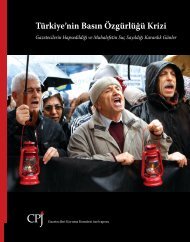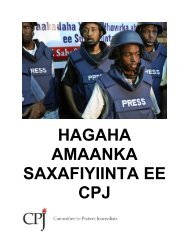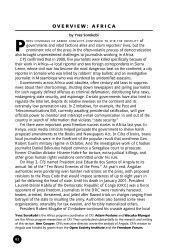Attacks on the Press - Committee to Protect Journalists
Attacks on the Press - Committee to Protect Journalists
Attacks on the Press - Committee to Protect Journalists
- No tags were found...
Create successful ePaper yourself
Turn your PDF publications into a flip-book with our unique Google optimized e-Paper software.
attacks <strong>on</strong> <strong>the</strong> press in 2009middle east and north africa: moroccoOpenNet Initiative, an academic collaborati<strong>on</strong> that studies <strong>on</strong>line censorship,said <strong>the</strong> regime c<strong>on</strong>ducts selective filtering of <strong>on</strong>line political c<strong>on</strong>tent. In areport published in August 2009, OpenNet also noted that “a number of independentand pro-oppositi<strong>on</strong> Web sites were found <strong>to</strong> be sporadically hacked anddefaced, and <strong>the</strong>ir c<strong>on</strong>tent replaced with pro-Libyan leader c<strong>on</strong>tent.” Blogs werefew in number and tended <strong>to</strong> focus <strong>on</strong> culture and literature ra<strong>the</strong>r than politics,OpenNet said.The Libyan League for Human Rights offered an important reminder of <strong>the</strong>regime’s brutally repressive his<strong>to</strong>ry. On World <strong>Press</strong> Freedom Day, <strong>the</strong> organizati<strong>on</strong>released a list of reporters who had been murdered or who had disappearedover <strong>the</strong> past four decades. The list of “journalists who lost <strong>the</strong>ir lives for ethicallydoing <strong>the</strong>ir job” included Daif al-Gahzal al-Shuhaibi. His disfigured body wasfound in <strong>the</strong> suburbs of Benghazi <strong>on</strong> June 2, 2005, about two weeks after he wasreported missing, according <strong>to</strong> several sources. A former state media employee,he had recently begun writing <strong>on</strong>line articles describing official corrupti<strong>on</strong>. Todate, no credible and transparent inquiry in<strong>to</strong> al-Ghazal’s death has been c<strong>on</strong>ducted.In July 2007, news reports quoted al-Ghazal’s family as saying that aTripoli court sentenced three unidentified men <strong>to</strong> death for <strong>the</strong> murder. But independentjournalists noted that no official details were ever released about <strong>the</strong>supposed prosecuti<strong>on</strong>, and that al-Ghazal’s family might have been pressured byauthorities <strong>to</strong> make <strong>the</strong>ir statement.MOROCCOAs king mohammed vi marked his first decade <strong>on</strong> <strong>the</strong> alawitethr<strong>on</strong>e, his government moved aggressively <strong>to</strong> censor coverage of <strong>the</strong> royal familyand silence o<strong>the</strong>r critical news reporting, fueling deep c<strong>on</strong>cern about <strong>the</strong> future ofindependent journalism in this North African nati<strong>on</strong>.Reporting even positive news about <strong>the</strong> 46-year-old m<strong>on</strong>arch, portrayed asliberal-minded in 1999 when he succeeded his fa<strong>the</strong>r, King Hassan II, promptedretaliati<strong>on</strong>. On August 1, authorities destroyed more than 100,000 copiesof Nichane, an Arabic-language weekly, and Tel Quel, its French-language sister,both of which carried a public opini<strong>on</strong> poll in which 91 percent of resp<strong>on</strong>dentssaid <strong>the</strong>y viewed <strong>the</strong> king favorably. Three days later, <strong>the</strong> government banned anissue of <strong>the</strong> French daily Le M<strong>on</strong>de that also carried <strong>the</strong> poll results. “C<strong>on</strong>ductinga survey, <strong>the</strong> main focus of which is <strong>to</strong> ask <strong>the</strong> citizens <strong>to</strong> give <strong>the</strong>ir thoughts <strong>on</strong><strong>the</strong> king’s acti<strong>on</strong>s is in itself a violati<strong>on</strong> of <strong>the</strong> principles and <strong>the</strong> foundati<strong>on</strong> of<strong>the</strong> royal system,” Minister of Communicati<strong>on</strong> Khalid Naciri <strong>to</strong>ld reporters. “InMorocco, <strong>the</strong> m<strong>on</strong>archy cannot be <strong>the</strong> object of a debate, even through a survey.”Critical scrutiny of <strong>the</strong> royal family has been effectively criminalized. Theno<strong>to</strong>rious 2002 <strong>Press</strong> Law allows <strong>the</strong> government <strong>to</strong> ban local or foreign papersfound <strong>to</strong> “harm Islam, <strong>the</strong> m<strong>on</strong>archy, terri<strong>to</strong>rial integrity, or public order.” Twentysixseparate articles call for pris<strong>on</strong> penalties for journalistic activities c<strong>on</strong>sideredoffensive, but insulting <strong>the</strong> royal family is especially risky, with potential punishmen<strong>to</strong>f three <strong>to</strong> five years in pris<strong>on</strong>. Under <strong>the</strong> c<strong>on</strong>stituti<strong>on</strong>, <strong>the</strong> king is “sacredand inviolable.”Authorities used those legal <strong>to</strong>ols <strong>to</strong> obstruct and delay distributi<strong>on</strong> of <strong>the</strong>July 15 issue of Le M<strong>on</strong>de, and <strong>to</strong> ban <strong>the</strong> July 9-15 issue of <strong>the</strong> French weeklyLe Courrier Internati<strong>on</strong>al, news reports said. Le M<strong>on</strong>de carried an opini<strong>on</strong> pieceby Aboubakr Jamaï, former edi<strong>to</strong>r of <strong>the</strong> critical Moroccan weekly Le JournalHebdomadaire, in which he characterized <strong>the</strong> king’s press policy as a “war againstindependent journalism.” The banned issue of Le Courrier Internati<strong>on</strong>al reprintedan article <strong>on</strong> <strong>the</strong> m<strong>on</strong>arch’s pers<strong>on</strong>al wealth that initially ran in Le Journal Hebdomadaire.The piece was accompanied by an edi<strong>to</strong>rial car<strong>to</strong><strong>on</strong> calling MohammedVI “<strong>the</strong> richest king of <strong>the</strong> poor!”Questi<strong>on</strong>s about <strong>the</strong> king’s health were taboo. In Oc<strong>to</strong>ber, a Rabat court sentencedDriss Chahtan, managing edi<strong>to</strong>r of <strong>the</strong> independent weekly Al-Michaal,<strong>to</strong> a year in jail for “publishing false informati<strong>on</strong>” about <strong>the</strong> health of MohammedVI during a period when <strong>the</strong> king had not been seen in public, local journalists<strong>to</strong>ld CPJ. The court also sentenced Al-Michaal reporters Mostafa Hiran andRashid Mahameed <strong>to</strong> three m<strong>on</strong>ths in pris<strong>on</strong> in c<strong>on</strong>necti<strong>on</strong> with <strong>the</strong> Septemberarticles, but <strong>the</strong>y were not immediately taken in<strong>to</strong> cus<strong>to</strong>dy. Defense at<strong>to</strong>rneys<strong>to</strong>ld CPJ that <strong>the</strong> trial did not meet basic fairness standards, notably in <strong>the</strong> court’srefusal <strong>to</strong> allow <strong>the</strong> defense <strong>to</strong> summ<strong>on</strong> witnesses. The same m<strong>on</strong>th, a Rabatcourt c<strong>on</strong>victed Managing Edi<strong>to</strong>r Ali Anouzla and reporter Bochra Daou of <strong>the</strong>daily Al-Jarida al-Oula <strong>on</strong> similar “false informati<strong>on</strong>” charges in c<strong>on</strong>necti<strong>on</strong> withs<strong>to</strong>ries <strong>on</strong> <strong>the</strong> king’s health. They were sentenced <strong>to</strong> suspended terms.In September, police shut down <strong>the</strong> Casablanca daily Akhbar al-Youm after<strong>the</strong> Ministry of <strong>the</strong> Interior accused <strong>the</strong> newspaper of showing “blatant disrespect”in publishing an edi<strong>to</strong>rial car<strong>to</strong><strong>on</strong> c<strong>on</strong>cerning a “strictly private weddingcerem<strong>on</strong>y organized by <strong>the</strong> royal family.” Prince Moulay Ismail, cousin of KingMohammed VI, was married in a cerem<strong>on</strong>y that, though private, had generatedc<strong>on</strong>siderable public interest. On Oc<strong>to</strong>ber 30, a Casablanca court sentenced TaoufikBouachrine, <strong>the</strong> paper’s publisher and edi<strong>to</strong>r, and car<strong>to</strong><strong>on</strong>ist Khalid Gueddar<strong>to</strong> suspended jail sentences and m<strong>on</strong>etary penalties for failing <strong>to</strong> show respect <strong>to</strong><strong>the</strong> royal family. The court also upheld <strong>the</strong> closing of <strong>the</strong> newspaper.Moroccan courts have often been used <strong>to</strong> settle scores with critical journalists,CPJ research shows. In its annual report released in June, <strong>the</strong> Moroccan Associati<strong>on</strong>for Human Rights said <strong>the</strong> courts were being used routinely <strong>to</strong> punish critical2282 2 9


